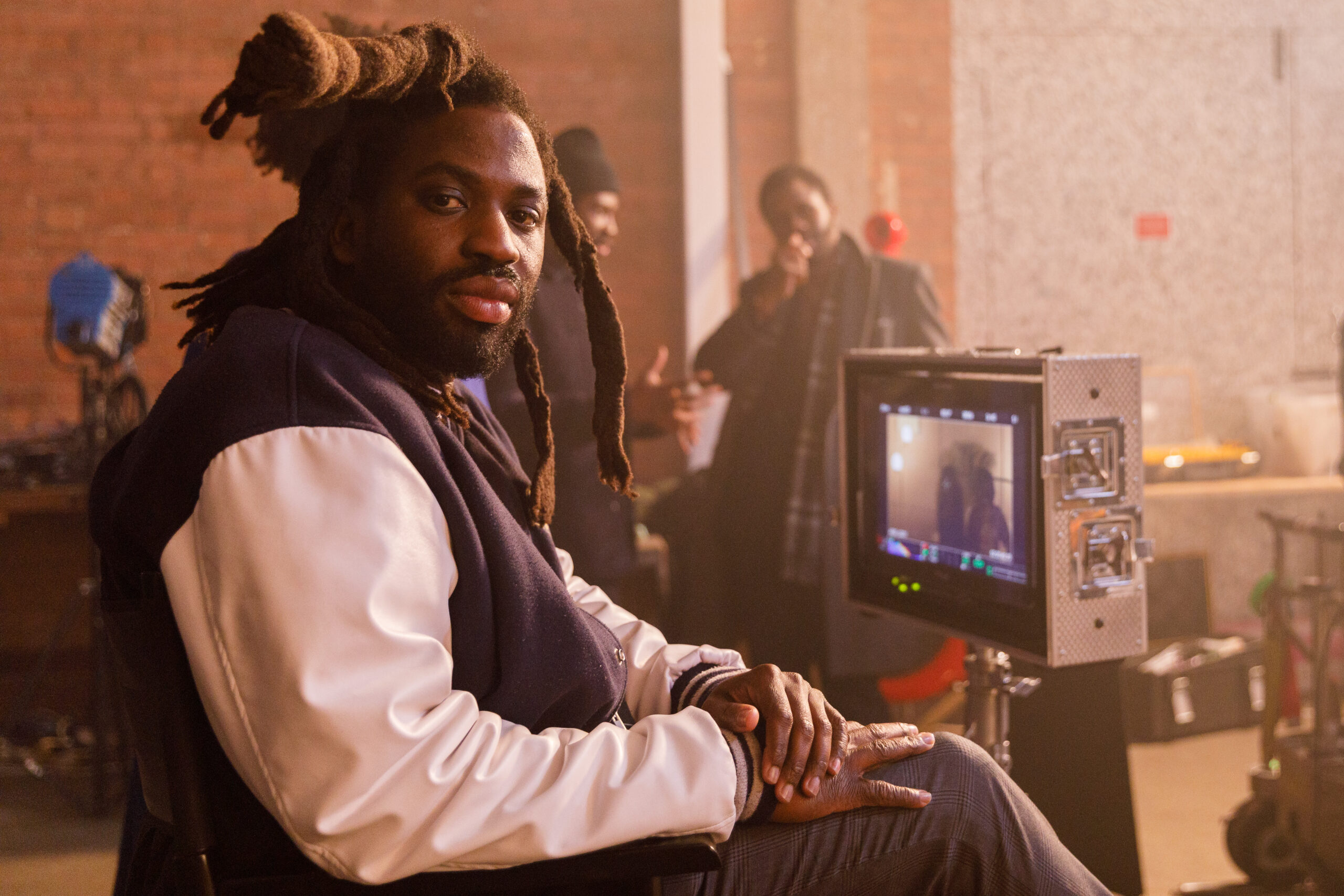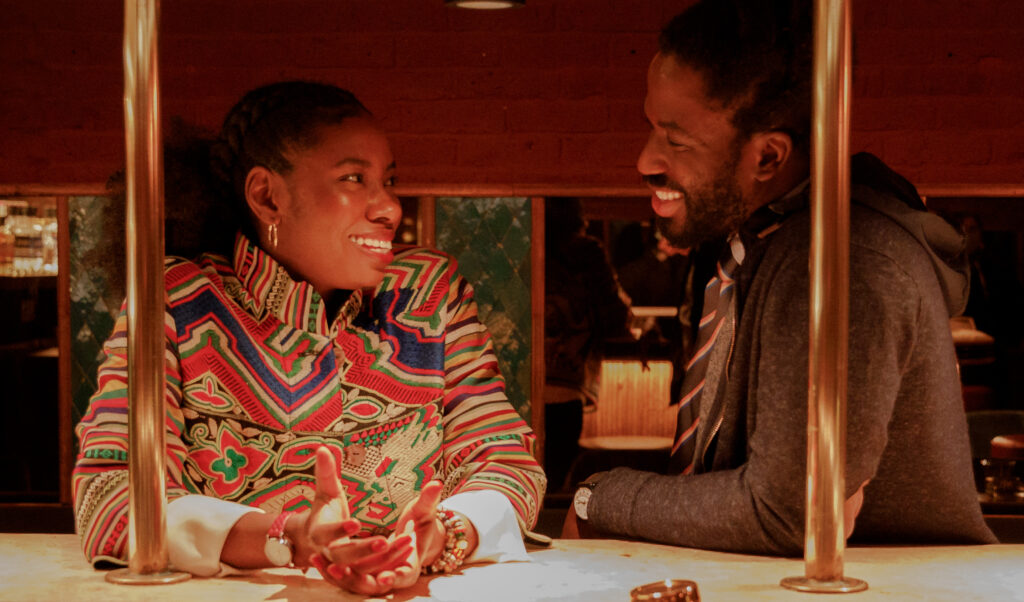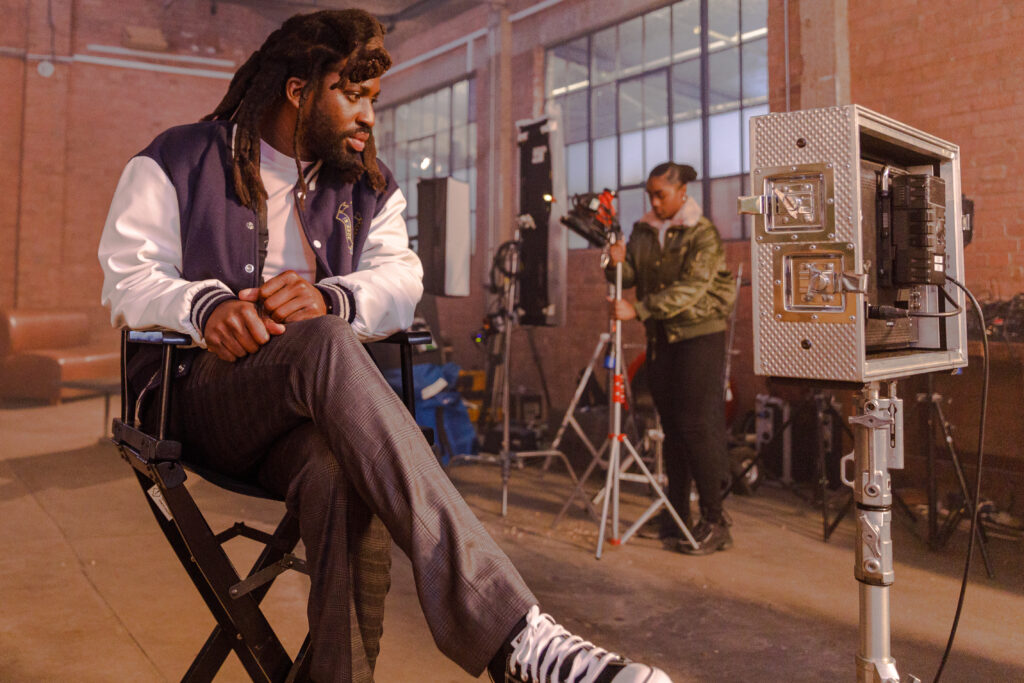‘Unless otherwise stated, every character is Black’: how Adjani Salmon is refocusing British TV
The creator of the BBC Three pilot Dreaming Whilst Black on creating a bountiful cycle of opportunity for Black creatives both behind and in front of the screen.
Kofo Ajala
11 May 2021

Still via BBC Three / Dreaming Whilst Black
When it comes to navigating predominantly white spaces, Black Brits could play a game of ‘microaggression bingo’ where everyone ties for first place. Whether it’s discussions about our hair, date night suggestions to watch 12 Years a Slave or the incessant skirting around of the ‘B-word’, in the BBC pilot, Dreaming Whilst Black, seeing them all play out on the small screen makes the realities of our shared experiences all the more clear. Some of the scenes that take place in the show are so true to life they might as well have been plucked right out of our heads.
“Whether it’s me or somebody else. Most things you see in the pilot have happened to someone,” says the show’s creator Adjani Salmon over Zoom. Though spoken with a slight chuckle, he’s not joking around.
It’s clear to Adjani that recreating microaggressions, even for the sake of communal humor, simply isn’t enough. “In film school, they’re always asking what’s the message? What are you trying to say? If I should ask myself, ‘What am I trying to say as a Black person in this space?’ it makes you really rethink what you’re making and what your purpose is.”
Though Adjani may ask us to remember our shared traumas, he also begs us to never forget our dreams. Dreaming Whilst Black brings some of our greatest creative desires to life on the small screen, and wants us to fight for them.
“What am I trying to say as a Black person in this space?”
Adjani Salmon
Dreaming Whilst Black began as a witty, semi-autobiographical nine-part comedy web series co-written by Adjani and writer Ali Hughes in 2018. Following the trials and tribulations of an aspiring filmmaker, Kwabena (played by Adjani), it has been adapted for BBC Three into a pilot, in the hopes of it being picked up for a full series.
The episode follows Kwabena “as he tries to make it through Babylon”. Initially those around him had no doubt that he’d make it in the TV industry, but years down the line, he finds himself stuck in a dissatisfying dead end job, still dreaming of what might have been. We watch him holding out for his dream as he navigates office microaggressions as scenes jump in and out of reality. But is he ready to step up?
If that isn’t enough to pique your interest, Dreaming Whilst Black teases at dark skin Black love too! We’re introduced to the character of Vanessa, (Babirye Bukilwa), with what might be the most iconic meet-cute ever!
“I feel like gal-dem can look forward to some Black love. The actress plays an important role in the show. Let’s say that,” Adjani laughs.

Even with our conversation restricted to Zoom, the filmmaker’s buoyancy and vibrance in discussing his influences (from film school peers to his most recent reads) matches the excitement of his pilot. During our conversation, he delves into the creative and personal journey that birthed his latest venture.
Adjani was born in London 1989. At the age of five, he moved back to Jamaica with his family and has early memories of creating comedy sketches with his cousins. He may not have known it at the time, but his love for this type of improv would later propel his career in both Jamaica and the UK. Surprisingly, Adjani initially studied architecture but left the profession to create BLIP, a production company focusing on adverts, as well as attending the Met Film School in London, where he graduated in 2013.
“I was kind of dissatisfied with who I was and where I was going with architecture at the time,” he explains. “I felt like I fell in love with the process of making films, of telling visual stories.”
Before attending film school, the idea of making ‘Black films’ was a strange concept to Adjani, who has worked on other productions including Enterprise and Drunk History: Black Stories for Comedy Central.
“I remember coming to England and my bredin from acting school being like ‘yo what you sayin’ you on that Spike Lee ting, that Black Film ting.’ And I was just kind of like, Nah, bro, I’m just gonna try and make films, me no really wan make no Black film.’” Growing up in Jamaica, blackness was never something to be sought after before – it was simply an inherent and almost inescapable element of his life and work. “To me, Black is the centre,” he adds.
“To me, Black is the centre”
Adjani Salmon
But as the pursuit of his passions left him interacting more intimately with predominantly white spaces, Adjani soon came face to face with the added burdens of trying to make a name for himself in Britain’s near impenetrable creative industries. “I think there’s a level of privilege to my upbringing in that Blackness was just all around me. But there was an element of unknowing.” He soon realised that, through the pursuit of their own dreams, his Black peers in film were putting in the work to see other Black creatives achieve their goals too.
In particular he remembers Tomisin Adepeju, a British-Nigerian filmmaker in the year below him at the Met, who insisted on sourcing more Black performers to act out his screenplays for assignments during his course assignments.
“In my head, I just approached it as a school project […] I thought it wasn’t my business. But, I remember hearing him say that and thinking […] being the other made me really have to take another look at Blackness from Tomisin’s perspective: from a Eurocentric perspective.”
The influences of these lessons are present in the pilot. The episode begins in the middle of a bustling TV production set. The full and brassy opening verse to Fela Kuti’s ‘’Black Man City’ plays in the background, setting the tone for something practically unheard of in mainstream British media: an all Black TV crew. When reflecting on the choice of music, Adjani admitted that he wasn’t too sold on the Fela track “but, like, who else represents this un-apologeticness?” He continued: “I really wanted our people to know from the jump. This thing they’re about to watch right here? Different.”
But what Dreaming Whilst Black makes clear is that the dream of unapologetic Blackness was one that could not just be visualised for just one man. In dreaming of a world where Kwabena’s dreams could be realised, Adjani champions the dreams of all aspiring Black creatives who want to see themselves in these spaces. Adjani lifts the script for Dreaming While Black to his laptop camera and I can see on the cover that it says, “unless otherwise stated, every character described is black”.

The UK is almost notorious for its lack of diversity behind the screen, so knowing that Adjani is truly manifesting dreams into realities is heartwarming.
“I was very adamant when Dreaming Whilst Black came that I wanted a Black crew. I wanted Black heads of department. And predominantly, our crew was Black and Brown people.” He was so intent on putting Black people on, that even the catering on set came from a Black-owned business. “I asked myself, am I really here for Black people? Or am I just trying to make money from Black people? […] I tried to make sure that with the power I do have that I use it for the betterment of us.”
“I asked myself, am I really here for Black people? Or am I just trying to make money from Black people?”
Adjani Salmon
It was around the time of creating Dreaming Whilst Black that Adjani started reading more, something he admits he was never really his thing up until that moment. He laughs as he recalls his mother forcing him to read Harry Potter books as a child.
“I guess being in England as well opened me up to the Black diaspora – to Blackness on a continental level.” He talks about reading The Fire Next Time by James Baldwin, a book breaking down racism in America, the first half of which is dedicated to his nephew. From this Adjani learned about the importance of acknowledging those you dedicate your work to and the effect this should have on the way you tell your stories.
“There’s a certain level of love and care that you can see his tone. And that really made me think about my work as well because when you start thinking about who it’s dedicated to, you start tweaking your language to make sure that you’re taking care of their sensibilities and taking care of their emotions. People have made stuff for us, but did not love us because they didn’t dedicate it to us.”
At the heart of Adjani’s creative journey is a love for the craft of storytelling. And from this love was born a story to nurture the dreamer in us all. Dreaming Whilst Black is an ode to the Black creative. Even during uncomfortable scenes in the pilot we find levity in knowing that this show is not just about us, but dedicated to us.







